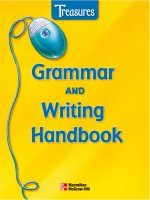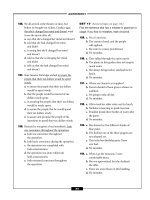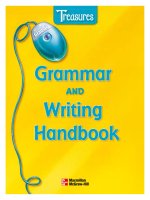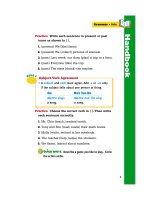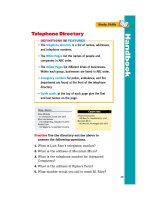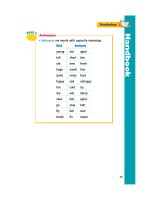grammar and writing handbook grade 4
Bạn đang xem bản rút gọn của tài liệu. Xem và tải ngay bản đầy đủ của tài liệu tại đây (5.6 MB, 157 trang )
GRADE 4
Grammar and
Writing Handbook
ISBN: 0–328–07540–X
Copyright © 2004, Pearson Education, Inc.
All Rights Reserved. Printed in the United States of America.
This publication is protected by Copyright, and permission should be obtained
from the publisher prior to any prohibited reproduction, storage in a retrieval system,
or transmission in any form by any means, electronic, mechanical, photocopying,
recording, or likewise. For information regarding permission(s), write to: Permissions
Department, Scott Foresman, 1900 East Lake Avenue, Glenview, Illinois 60025.
1 2345678910 V000 09 08 07 06 05 04
scottforesman.com
Editorial Offices: Glenview, Illinois • Parsippany, New Jersey • New York, New York
Sales Offices: Parsippany, New Jersey • Duluth, Georgia • Glenview, Illinois
Coppell, Texas • Ontario, California • Mesa, Arizona
Writer ’s Guide
Writer ’s Guide
5
5
Ideas and Content
Good writers set out with a main idea and a purpose in mind. The
main idea is the point they want to make. The purpose is how they will
make that point. Will the writing inform, persuade, or entertain readers?
Even a phone message has a main idea and a purpose.
WRITER’S GUIDE
WRITER’S GUIDE
6
Writing Ideas and Content
Mom,
Sam has a ride home
from soccer tonight
with Mr. Kim. He will be
here by 6.
Jamie
Main Idea How and
when Sam will get home
Purpose To inform Mom
Details Details support and develop your main idea.
This telephone note tells Mom who is driving Sam
and when he is arriving. These details give important
information. Details can also make writing lively and
interesting. Compare the two sentences below.
Our dog likes candy. (lacks detail)
Our collie Shadow cocks her head and wags her tail
when she hears a candy wrapper crinkle. (adds interest)
Strategies for Choosing a Topic and a Purpose
• Choose a topic that you can work with. For example, “Famous
Presidents” is too large a topic for a one-paragraph essay.
• Choose a purpose that fits your topic. For example, a funny
story would entertain readers, but an article on war might not.
FOCUS
Everything you
write should
support your main
idea. Details that
are off the subject
or unimportant
weaken writing.
Writing Ideas and Content
7
WRITER’S GUIDE
WRITER’S GUIDE
Match the number of each writing assignment with the letter
of the purpose that best suits it.
A To entertain B To inform C To persuade
1. Arguments for year-round school
2. A recipe
3. A story about a funny day at school
Read the paragraph below. Write the number of any sentence that
does not focus on the main idea stated in the first sentence.
4. The colors of wildflowers attract animals for pollination.
5. Yellow lantana flowers attract butterflies. 6. Blue flowers are
my favorite. 7. Birds like bright red poppies. 8. Wind also helps
pollinate flowers. 9. The colorful birthwort flower attracts flies,
covers them with pollen, and then lets them escape. 10. One
flower even smells like rotten meat to attract flies.
Complete one of the following sentences to begin a paragraph.
Then write three sentences of your own to give details about
the first sentence.
_____ make the best pets.
The best movie I ever saw was _____.
My favorite season is _____.
_____ is the best sport.
C
B
A
Organization
When you write, you need to put ideas in an order that makes sense.
Organization—the way ideas are put together—is like the skeleton
of a body. It holds things together and gives shape.
Here are some ways to organize your writing.
• a story with a beginning, middle, and end
• a comparison-contrast
• a step-by-step explanation
• a description from top to bottom
Before you begin to write, think of the best way to put your ideas
together. For example, if you are describing how two best friends
are alike and different, a comparison-contrast would work.
If you are telling about something that happened to you,
a story form would be good.
Choosing a basic structure is only the first step
in organizing your writing. You will also need to
connect your ideas and make them move from
beginning to end.
Strategies for Organizing Ideas
• Save the most important idea until last and
build up to it.
• Use sequence words such as first, next, tomorrow,
and finally.
• Use connectors such as but and however to show
differences and too and also to show likenesses.
WRITER’S GUIDE
WRITER’S GUIDE
8
Writing Organization
GRAPHIC ORGANIZER
A graphic organizer
such as a web, Venn
diagram, or outline
can help you organize
your ideas.
Writing Organization
9
WRITER’S GUIDE
WRITER’S GUIDE
Match the number of each writing assignment below with the
letter of the organization it calls for.
A Description C Comparison-contrast
B Story D Step-by-step explanation
1. Tell about what happened on your first day of school.
2. Explain how to find information on the Internet.
3. Tell how baseball is different from soccer.
4. Describe a friend from head to toe.
Write the best word or words from the Connecting Words box
to make each sentence flow smoothly.
Pets are fun. 5. _____, they are also work. 6. _____ of all, before
getting a pet, consider how much care it will need. Remember that
a dog needs to be walked, but a hamster does not. 7. _____, think
about what kind of pet suits your home. 8. _____, if you live in an
apartment, a small animal may be a better pet than a large one.
9. _____, ask yourself where your pet will live. Are you willing
to share your room if you have to?
Think of a machine, toy, tool, or similar object. Write a step-by-step
explanation that tells how this object works. Use words such as first,
next, now, and finally to show the steps in order.
C
Connecting Words
However Finally For example
First Next
B
A
Voice
Voice is the you that comes through in your writing and
makes it interesting. Voice reveals tone and style, as well
as your personality. Writers with a strong voice engage
their readers and speak directly to them. Voice shows
that the writer knows a topic and cares about it.
• When I was young, I didn’t like asparagus. (weak voice)
• I used to cry in my highchair, as I pushed slimy green
asparagus off my plate. It looked like snakes. (strong voice)
Strategies for Developing Your Voice
• Know your purpose and audience. A story
about a funny event written to a friend should
have a light, playful voice. A research paper
for your teacher should have a serious,
well-informed voice.
• Choose words to match your voice. Persuasive
writing requires words such as should, best, and
most important. Informal language, perhaps
exaggeration or even slang, suits a friendly,
casual voice. Figurative language can add
a strong voice. A business letter requires
objective, precise word choice.
• Remember that all good writing needs a voice to
hold a reader’s interest. Voice should be engaging,
lively, and interesting. Let your readers know
how you feel about your subject.
WRITER’S GUIDE
WRITER’S GUIDE
10
Writing Voice
VOICE
Voice makes
writing come to
life. Depending
on the topic, voice
may be lively,
honest, excited,
humorous, or
suspenseful.
Writing Voice
11
WRITER’S GUIDE
WRITER’S GUIDE
Match the numbered item with the type of writing it is.
A Newspaper article C Business letter
B Humorous article D Persuasive piece
1. Please send me a year’s subscription to Campers’ Guide.
Enclosed is a check for $15.
2. Our class must help save our universe by recycling.
3. After Sanpa ate corn, buttered kernels glowed on his beard
like jewels. I expect to see birds nesting there one day.
4. At noon today a crowd of 2,000 cheered the Cambridge
lift-off from Cape Kennedy.
Each underlined part of the following business letter has a “voice
problem.” Match the letter of the problem with each numbered item.
A Unnecessary information C Slang
B Inappropriate humor D Overly formal language
Dear Channel 29:
5. Your TV special on sunken treasures was way cool
. 6. I have
per
used publications about this topic. 7. Where did you ever “dig
up” (ha!) all those photographs? 8. Could you please send me more
information so I can raise my grade, which I desperately need to do
?
Kyra Sathers
Complete one of the following statements. Then add sentences to
write a paragraph. Use a voice that fits your topic.
I like (do not like) people who _____ because _____.
If I could be an animal, I would be a _____ because _____.
My favorite memory is _____ because _____.
C
B
A
Word Choice
Have you noticed that good writers choose their words carefully?
Strong verbs, exact nouns, and vivid adjectives make their writing
clear and lively.
• Kids don’t like that dog because of the fact that he’s mean.
(dull and wordy)
• Kids scream when Rusty snarls and lunges on his leash.
(lively)
Strategies for Improving Word Choice
• Use specific nouns. (canary instead of bird, ballerina
instead of dancer)
• Use strong verbs. (wriggle instead of move, splinter
instead of break)
• Appeal to the senses. (“My teeth are chattering”
instead of “I am cold,” “hair looks like spun gold”
instead of “hair looks pretty”)
• Consider rewriting sentences that have is, was,
were, am, and are. (“My stomach churned” instead
of “I was sick”)
• Replace words such as nice, great, thing, and stuff
with exact words. (“I collect coins and stamps”
instead of “I collect things”)
• Get rid of wordiness. (because instead of
“due to the fact that”)
WRITER’S GUIDE
WRITER’S GUIDE
12
Writing Word Choice
“Wow” Words
Be on the lookout
for “wow” words
that make writing
come alive: silky,
shiver, syrup, ker-
plunk, slurp, dazzle,
slimy, splatter.
Keep a notebook
handy to record
these words.
Writing Word Choice
13
WRITER’S GUIDE
WRITER’S GUIDE
Choose the word that is more vivid or exact to complete each
sentence. Write the sentence.
1. The baby (called, whimpered) for her mother.
2. The car (clattered, moved) down the road.
3. (Old, Wilted) flowers lined the sidewalk.
4. Max (spoke, muttered) his speech in the play.
5. I (stumbled, went) down the path.
6. The angry bulls (ran, stampeded).
7. Water (went, sprayed) all over the kitchen.
Replace an underlined word with a word or words from the box.
Rewrite each sentence.
8. Sometimes we watch animals
at the
zoo. 9. They walk on weir
d legs. 10. Their
eyes look
out. 11. It’s fun to see them eat leaves
from the high branches of trees. 12. One time I saw
a giraffe take
something. 13. It was a little boy’s toy.
Write a description of your favorite place outdoors.
Use vivid words that appeal to the senses.
C
snatch helium balloon stilt-like
nibble giraffes bulge
B
A
Sentences
Good writing flows smoothly. It is a pleasure to read aloud.
Different lengths and kinds of sentences create a rhythm and style.
Here are some ways to improve your sentences.
• Vary sentence length. Avoid having all short, simple sentences.
• Vary sentence types. An interrogative, imperative, or exclamatory
sentence can add excitement.
• Use different beginnings. Too many sentences beginning with I, he,
or the make for a dull style.
• Use connectors. Words such as first, but, and, although, while, and
however make sentences flow smoothly. However, do not connect
too many ideas with so, and, or because.
Strategy for Improving Sentences
Number each sentence of your writing. Then make a chart like this.
Filling out your chart may reveal areas to improve. You may learn
that you write mostly short declarative sentences beginning with the or I.
You may learn that you use the word and to string too many ideas
together. When you revise your work, try to improve these areas.
WRITER’S GUIDE
WRITER’S GUIDE
14
Writing Sentences
Sentence
number
Number of
words
First word Type of
sentence
(Interrogative,
Declarative,
Imperative,
Exclamatory)
Connector
words
Writing Sentences
15
WRITER’S GUIDE
WRITER’S GUIDE
Combine these short, choppy sentences. Use the connector provided.
Write the sentences.
Example: The plants froze. No one brought them in. (because)
Answer: The plants froze because no one brought them in.
1. Ted made the hockey team. He’s only ten. (although)
2. Luis stayed home. He had a cold. (because)
3. Mother painted. I played my violin. (while)
4. We tried. We lost. (but)
In the paragraph below, rearrange words in each sentence so that
it does not begin with I. Start with the underlined word or phrase.
Write the sentences.
Example: I got Tinker last fall
from my dad.
Answer: Last fall I got Tinker from my dad.
5. I had begged for a tropical fish for years
. 6. I went with
my dad one Satur
day to Pet Scope. 7. I saw the striped fish that I
wanted immediately
. 8. I named him Tinker in the car. 9. I filled
the fish tank with water befor
e lunch. 10. I get to buy two more
fish next year
.
Write a description of your favorite food,
friend, book, TV program, or sport.
Include one interrogative and one
exclamatory sentence. Make sure each
sentence begins with a different word.
C
B
A
Conventions
Conventions are the rules for written language. They are signals that
help readers understand writing. For example, sentences begin with
capital letters and end with punctuation. Paragraphs are indented.
Grammar and spelling follow patterns.
• me and willie ax mama aunt belle and max the question
we didnt get a answr. (weak conventions)
• Willie and I asked Mama, Aunt Belle, and Max the question.
We didn’t get an answer. (strong conventions)
Strategies for Conventions
• Use a dictionary or spell-checker to check spelling.
• Make sure sentences are complete, with correct
capitalization and punctuation.
• Check that subjects and verbs agree.
• Make sure you have used the correct forms
of pronouns, especially pronouns that are
compound subjects or objects.
• Make sure you haven’t changed verb tenses
by mistake.
• Check the use of apostrophes in possessive
nouns and contractions.
WRITER’S GUIDE
WRITER’S GUIDE
16
Writing Conventions
PROOFREADING MARKS
New paragraph
Capital letter
Lowercase
letter
Correct
the spelling.
Add something.
Remove
something.
Writing Conventions
17
WRITER’S GUIDE
WRITER’S GUIDE
Choose the correct answer and write each sentence.
1. (There, They’re) planning to go to California.
2. Sally and (me, I) will meet in San Francisco.
3. Sam has (went, gone) there already.
4. I (was’nt, wasn’t) going to take the train.
5. Give (her and me, she and I) the test.
Match the letter with the mistake in each sentence.
A Capitalize a proper noun.
B End sentence with a question mark.
C Correct a misspelling.
D Add an apostrophe.
E Change a capital letter to lowercase.
6. Humpback whales are talented singers of the Sea.
7. These creatures odd sounds range from chirps and moans to
bellows and belches. 8. Underwater, there songs can be heard
for miles. 9. Did you know that a humpback can eat a ton of
food a day. 10. Each year, people go to Australia and hawaii
to see these interesting creatures.
Write four sentences about one of the topics below. Pay
special attention to spelling, grammar, punctuation,
and capitalization. Exchange papers with
a partner and proofread.
• Something I would like to change
• Someone I would like to meet
• Somewhere I would like to go
C
B
A
PROOFREADING
A good proofreader
is a detective. Look
closely for mistakes.
Here are some tricks
to catch errors.
Start reading in
the middle of your
work. Use a ruler to
go line by line. Read
your work aloud.
Using a Scoring Rubric
What makes an excellent piece of writing? How is it different from writing
that is good, or not good? One way to judge a written work is to use a
scoring rubric. A rubric is a checklist of qualities, or things to look for.
See pages 6–17 for a discussion of these qualities.
Rubrics give a number score for each quality. You can use a rubric such
as the one below to judge your writing.
WRITER’S GUIDE
WRITER’S GUIDE
18
Using a Scoring Rubric:
WORD
SCORE IDEAS/CONTENT ORGANIZATION VOICE CHOICE SENTENCES CONVENTIONS
4
Clear, focused, Smooth flow Honest, Precise, Smooth, Excellent
well-supported of ideas from engaging, interesting, varied, and control with
ideas beginning to lively and accurate rhythmic only minor
end, with writing words sentences errors
connecting
words
3
Ideas usually Information At times Correct and Generally Good control;
focused and given in reveals adequate smooth, no serious
supported some order writer’s words varied errors prevent
personality sentences understanding
2
Ideas sometimes Little direction Fails to Limited Awkward Weak control
unfocused and from beginning engage vocabulary; or wordy with errors
undeveloped to end audience lacks sentences that make
or show freshness with little writing hard
emotion variety to read
1
Ideas confusing Ideas hard to Flat writing Incorrect, Choppy Many errors
and unsupported follow with no with no dull, or sentences; that prevent
direction feeling overused run-ons understanding
words or fragments;
and overused
as connector
Writing Models
19
WRITER’S GUIDE
WRITER’S GUIDE
SCORE 4
Ideas/Content Focused on the accident; supported with details
Organization Connectors soon, while, and finally move story
along; has a clear ending
Voice Strongly engages readers (Splat!, nasty)
Word Choice Vivid word choice and images (skidded, slippery,
“taste blood”)
Sentences Varied, clear sentences with good rhythms
Conventions Some misspellings (stiches, emergancy)
I was running from the pool after swimming practice
when I skidded on the slippery cement. Splat! I could taste
blood and started to shiver. My mom grabbed me and soon
we were in the emergancy room. Instead of stiches they
used special glue on my lip. It stung and smelled nasty. While
we waited for the glue to dry, Mom read me a book about
alligators in the Everglades. Finally I was in one piece
again! Next time, I won’t run.
Writing Models
Following are four responses to a prompt. Read the responses and the
notes below them to see how each piece got its score.
Writing Prompt: Write about an accident you had and how
someone helped.
WRITER’S GUIDE
WRITER’S GUIDE
20
Writing Models
SCORE 3
Ideas/Content Focused on the accident and supported
with many details
Organization Could add connectors such as then to make
events flow more smoothly; has a clear ending
Voice Writer’s feelings revealed (“I wanted to crawl…”)
Word Choice Good use of verbs (sprayed, crawl)
Sentences Some wordiness (“due to the fact that,” “like”);
could combine some short sentences
Conventions A few mistakes; some spelling errors
(Macroni, embarased)
It was my first day at Bell School. I slipped on some
butter in the cafeteria. Macroni and peas sprayed all
over due to the fact that I dropped my tray. My shirt
was soaked with milk. I was so embarased. I wanted
to crawl under a table. Bill Mellis gave me his napkin
to wipe things up. He went back in the line with me
to get another lunch. He’s like my best friend now.
We both laugh when they serve mac and cheese
and peas on Mondays.
Writing Models
21
WRITER’S GUIDE
WRITER’S GUIDE
SCORE 2
Ideas/Content Focused on the accident but needs more
supporting details
Organization Moves from a beginning to an end
Voice Gives readers a sense of who the writer is
Word Choice Limited, dull word choice (got, put)
Sentences Opens with a fragment; wordy
Conventions Misspellings (tugh, frosen, whet, runing),
shifts in verb tense (“my mom came and calls”)
When I was stuck because I got my tugh on a frosen
stick and my mom came and calls the police. They put
hot water on me and it was so hot it burned my tugh.
I learned my lesson. Then my little sister was going to put
her tugh on a stick and I whet runing and tell her don’t
do it because they will put hot water on you. She says
she won’t do that any more.
WRITER’S GUIDE
WRITER’S GUIDE
22
Writing Models
SCORE 1
Ideas/Content No explanation of what the accident was;
lacks meaningful content and development
Organization Ideas arranged into three days
Voice Writer not involved
Word Choice Limited, dull word choice
Sentences No clear sentences or end punctuation; overuse
of the connector and
Conventions Incorrect capitalization, misspellings (helpt,
haspetal, sooup, Secont), and tense shifts (send, Stay, leave)
My mom helpt me But it did not work She send me to
the haspetal and I Stay on the First Day I ate sooup and
on the Secont Day I ate more Sooup and on the last Day
I ate pizza and I leave
Grammar and
Writing Lessons
Grammar and
Writing Lessons
23
Sentences
A sentence is a group of words that expresses a complete thought.
Sentences are used to tell, ask, command, or exclaim. All sentences
begin with a capital letter and end with a punctuation mark.
Sentence: I will visit my grandfather.
Not a sentence: Will visit my grandfather.
Read each group of words. Write S if it is a sentence. Write NS
if it is not a sentence.
1. Made breakfast in the morning.
2. I hate making my bed!
3. We always sweep the porch at night.
4. Could you help do some chores?
5. Why the dishes?
Choose the group of words in ( ) that will complete each sentence.
Write the complete sentence.
6. _____ works on a ranch. (Grandpa/Rides)
7. He _____. (a house/lives in a house)
8. _____ fed all the animals on his ranch. (We/Look)
9. Grandpa _____. (and I/gets up early)
10. _____ does his chores every day. (He/Cleans)
11. He _____. (washes the dishes/quietly)
12. _____ are going to a festival. (Every day/He and I)
A
UNIT 1 GRAMMAR
24
Grammar A Visit with Grandpa
Write the group of words in each pair that is a sentence.
1. The cowboy rode a horse.
Many famous cowboys.
2. Rodeos are fun.
Places to see cowboys.
3. Bust broncos and drive cattle.
Cowboys work hard.
4. Cowboys sing songs.
Sit around the campfire.
5. Cowboys on a ranch?
Do you want to be a cowboy?
6. Bill Pickett was a famous cowboy.
Met a famous cowboy.
7. On the prairie.
Wild horses run free.
8. Look at the cowboy!
At the cowgirl?
Add a word or group of words to complete each sentence.
Write the complete sentences.
9. Every morning I _____.
10. _____ can’t find my shoes.
11. _____ eat a big breakfast.
12. Then I _____.
13. Before lunch I _____.
14. _____ run and play in the meadow.
C
B
UNIT 1 GRAMMAR
Grammar A Visit with Grandpa
25
Review and Assess
Read each group of words. Write S if it is a sentence. Write NS if it is
not a sentence.
1. Many animals live on a ranch.
2. Are cows, horses, and birds?
3. Cardinals like to sing and whistle.
4. Cattle eat hay, grass, and corn.
5. Sometimes leap the fence.
Read each group of words. Write the letter of the word or group
of words that will make a complete sentence.
6. Three young deer _____ through the forest.
A baby C slowly
B girl D ran
7. _____ likes to be bitten by mosquitoes.
A Nobody C Enjoys
B Rarely D Hurt
8. Wild horses _____ during the night.
A always C the road
B noisy D escaped
9. The rabbit _____ through the grass.
A bunny C hopped
B fur D under
10. The old dog _____ on the porch.
A or cat C yesterday
B under D slept
UNIT 1 GRAMMAR
26
Grammar A Visit with Grandpa
Telling About You in Personal Narratives
Personal narratives tell about an interesting event or experience in your
life. They should include sentences about how you feel and look and what
you do. Be sure to use complete sentences.
Complete the sentences below with details from the box.
Write the new paragraph.
1. I _____ spending July with my grandpa in Maine. 2. I can tell
that Gramps _____. 3. Every morning he is out in his garden _____.
4. I put on _____ and join him. 5. We _____ in the garden all
morning. 6. After gardening I cool off by _____ at the park. 7. Then
I walk around and _____ for a scrapbook of these special visits.
Tell about yourself by completing these sentences.
Write the sentences.
8. My favorite thing to wear is _____.
9. I am happy when I _____.
10. I will never forget _____.
11. When I was small, I _____.
12. When I’m excited, I _____.
Write a personal narrative about a place or person that you have
visited. Tell how you felt, looked, and acted.
C
B
Feel looks forward to my visits; really enjoy
Look in an old straw hat; shorts and a T-shirt
Act weed; swimming in the pool; take photos
A
UNIT 1 FOCUS ON WRITING A PERSONAL NARRATIVE
Writing a Personal Narrative A Visit with Grandpa
27
WHO ARE YOU?
Tell about you in
your narrative—
your smile, the
way you dress,
or your favorite
things to do.
Subjects and Predicates
The subject is the word or group of words that tells whom or what the
sentence is about. The simple subject is the main noun or pronoun
in the complete subject. The predicate is the word or group of words
that tells something about the subject. The simple predicate is the
verb in the complete predicate. A simple subject and a simple
predicate can be more than one word.
The train arrived in the station. The train arrived in the station.
Write each sentence. Underline the complete subject and circle
the complete predicate.
1. The train was fast.
2. Ken read a book on the train.
3. Many trains leave in the morning.
4. The train conductor smiled.
5. He checked my ticket and winked at me.
Write each sentence. Underline the simple subject once and
the simple predicate twice.
6. I love trains.
7. Some trains are very long.
8. I have seen some small trains too.
9. Mrs. Grant will take me on the train next week.
10. We are planning a trip to the museum.
A
UNIT 1 GRAMMAR
28
Grammar Train to Somewhere
Complete Subject Complete Predicate Simple Subject Simple Predicate
